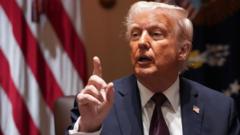As US President Donald Trump announces a hefty 25% tariff on imported cars and car parts, Germany has made it clear that it will not be yielding to U.S. pressure. German economy minister Robert Habeck emphasized the need for the European Union to respond with strength and confidence, declaring that yielding to the tariffs would only encourage further economic aggression from the U.S.
Germany Stands Firm Against US Car Tariffs as Global Retaliation Looms

Germany Stands Firm Against US Car Tariffs as Global Retaliation Looms
Germany has vowed to resist US President Trump's 25% tariffs on car imports, urging Europe to respond decisively.
In a wave of global backlash, other nations have reacted firmly, with France calling the tariffs "very bad news" and Canada labeling them a "direct attack" on its automotive industry. Meanwhile, China accused the US of breaching international trade rules. The announcement had an immediate impact on stock prices in the automotive sector, with shares of German brands like Porsche, Mercedes, and BMW, along with French firm Stellantis, taking a noticeable hit on the market.
The newly imposed car tariffs are set to come into effect on April 2, with the additional tax on car parts expected to follow in May. Trump's administration defends these tariffs as essential for bolstering US manufacturing, stating that cars manufactured domestically would incur no additional taxes. However, industry analysts warn that the imposed tariffs could significantly increase vehicle costs by thousands of dollars due to heightened import fees on auto parts, particularly from Canada and Mexico.
Habeck’s statements echoed a broader sentiment among European leaders who are advocating for joint retaliation against US products to restore balance in trade relations. French finance minister Eric Lombard expressed that accepting such tariffs would put Europe in a vulnerable position, thus emphasizing the necessity of a united front.
Canadian Prime Minister Mark Carney also decried the tariffs, claiming they will have adverse effects on Canada's automotive sector, while discussions of alternative trade options are underway. In the UK, the car industry expressed disappointment at the announcement, highlighting that these tariffs could indeed fuel a trade war, pushing international consumers towards cheaper alternatives, such as those from China.
China's government underscored the futility of a trade war, suggesting that no nation's economic progress has been achieved through implementing tariffs. Japan and South Korea similarly voiced concerns about the tariffs’ potential implications on their respective economic relationships with the US. Notably, before the tariff implementation, South Korean automaker Hyundai announced a sizable investment in the US automotive market, which Trump touted as evidence of the effectiveness of tariffs.
As the situation unfolds, both Bosch in Germany and other international firms maintain confidence in their future operations in North America, suggesting a complex and evolving narrative in the global automotive market influenced by the new tariffs.
The newly imposed car tariffs are set to come into effect on April 2, with the additional tax on car parts expected to follow in May. Trump's administration defends these tariffs as essential for bolstering US manufacturing, stating that cars manufactured domestically would incur no additional taxes. However, industry analysts warn that the imposed tariffs could significantly increase vehicle costs by thousands of dollars due to heightened import fees on auto parts, particularly from Canada and Mexico.
Habeck’s statements echoed a broader sentiment among European leaders who are advocating for joint retaliation against US products to restore balance in trade relations. French finance minister Eric Lombard expressed that accepting such tariffs would put Europe in a vulnerable position, thus emphasizing the necessity of a united front.
Canadian Prime Minister Mark Carney also decried the tariffs, claiming they will have adverse effects on Canada's automotive sector, while discussions of alternative trade options are underway. In the UK, the car industry expressed disappointment at the announcement, highlighting that these tariffs could indeed fuel a trade war, pushing international consumers towards cheaper alternatives, such as those from China.
China's government underscored the futility of a trade war, suggesting that no nation's economic progress has been achieved through implementing tariffs. Japan and South Korea similarly voiced concerns about the tariffs’ potential implications on their respective economic relationships with the US. Notably, before the tariff implementation, South Korean automaker Hyundai announced a sizable investment in the US automotive market, which Trump touted as evidence of the effectiveness of tariffs.
As the situation unfolds, both Bosch in Germany and other international firms maintain confidence in their future operations in North America, suggesting a complex and evolving narrative in the global automotive market influenced by the new tariffs.





















